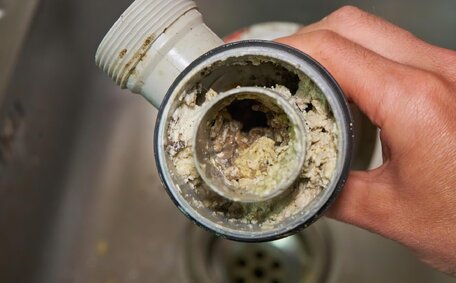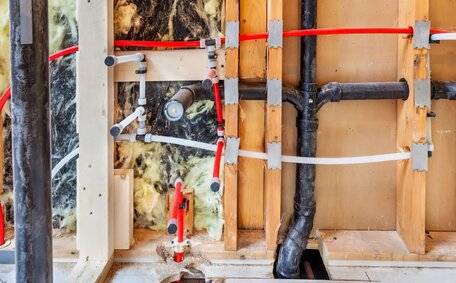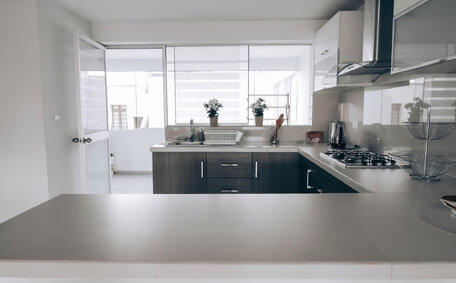What Causes Scaling in Hot Water Systems
Hot water systems develop scale primarily due to hard water, which is rich in minerals such as calcium and magnesium. When hard water is heated in the tank or pipes, these minerals precipitate and form solid deposits that cling to the surfaces.
You might question when water leads to scaling in your domestic hot water systems. Some of the key factors include:
- Water Hardness - Regions with particularly hard water, replete with minerals, are more prone to mineral precipitation and subsequent scale buildup.
- Temperature Fluctuations - Frequent heating and cooling cycles concentrate minerals and accelerate scaling.
- Stagnant Water - Water that remains still in domestic hot water pipes or tanks over time leads to the accumulation of mineral crystals.
- Oxygenation - Exposure to air through leaks/cracks causes oxidation that aids mineral deposition.
These factors result in calcium and magnesium hydroxide deposits hardening on heating elements and tank parts, diminishing system efficiency and service life by blocking pipes, restricting flow, and insulating elements.
Identifying Scale Buildup
You may wonder, 'How do I recognise scale buildup?' There are several key signs that can indicate scale buildup inside your hot water system:
- Reduced water flow - Similar to what happens in an espresso machine, scale build-up and mineral deposits restrict pipes and valves, leading to weaker water pressure and flow rates.
- Strange noises - Scale accumulation can cause your water tanks and heating elements to emit popping, cracking, or humming sounds.
- Fluctuating temperatures - Buildup around the heat exchanger hinders efficient heat transfer, resulting in uneven hot water temperatures.
- Discoloured water - White/yellowish scale flakes mixing into the water points to active scaling.
- Higher energy bills - A rise in energy required to heat water suggests insulating scale is hindering heat exchange.
Detecting scale buildup early on is crucial for timely descaling and removal of mineral deposits to prevent significant damage or system failure. Keep an eye out for these warning signs and consider preventative annual hot water heater maintenance to inhibit scaling.
Removing Existing Scale
Follow these steps to safely eliminate scale buildup from your hot water system:
- Turn off electricity to your water heater or set the gas heater’s control to 'pilot’, and then shut the cold water inlet valve.
- Connect a garden hose to the water drain valve at the bottom of the tank, ensuring it leads directly into a bucket or appropriate drain area. Open the pressure relief valve at the top.
- Add a commercial descaling solution, like an antifreeze solution, or use white vinegar to initiate the descaling process in your tank. Follow product instructions for amount. Target a 40-50% vinegar solution, independent of tank size; for example, maintain this ratio for a 150-litre tank.
- Let the solution sit in the tank for at least an hour to effectively descale your water system. For severe calcium lime scale, leaving it overnight works best to dissolve all calcium mineral deposits.
- Once enough time has elapsed, open the drain valve to flush the descaling solution throughout the system and out via the hose. This process washes the scale-laden water out your tank, removing loosened scale.
- After the flow ceases, disconnect the garden hose from the drain valve and prepare to refill the system with water. Close relief valve and turn cold inlet valve back on to refill tank with fresh water.
- Let the descaling solution run through the system by turning on the taps to rinse any residual scale flakes until the water runs clear. Your water system has now been descaled.
Descaling ensures more efficient flow of hot water through your system. A consistent yearly descaling routine and checking the anode rods help to prevent future scale buildup.
Natural Descaling Alternatives
There are some household products that can serve as natural and environmentally-friendly alternatives to commercial descaling solutions:
- White Vinegar - Its high acetic acid content breaks down scale deposits. Mix equal parts vinegar and water and circulate through hot water system.
- Lemon Juice - Contains citric acid to dissolve mineral buildup. More gentle on metals than vinegar.
- Citric Acid - Sold as a powder/crystal, citric acid works similarly to vinegar and lemon juice as a descaling agent.
While natural descaling methods are generally safe, gentle, and non-toxic, they may have limitations:
- Not as fast-acting or powerful as chemical descaling solutions.
- May also lead to not removing extremely stubborn scale on heating elements.
Consider natural descaling methods as part of a maintenance routine to avoid excessive scale accumulation. For removing heavy mineral deposits, commercial descaling products tend to be more effective.
Preventing Future Scale Buildup
There are several effective ways to prevent scale buildup and maintain your hot water system:
Install a Water Softener
Water softeners remove minerals like calcium and magnesium from the water supply before they enter your home’s plumbing. These systems conduct a softening process, exchanging hard mineral ions for softer sodium ions using ion exchange resin. Soft water impedes scale build up, safeguarding your pipes and heating elements.
Adjust Water Heater Settings
Lowering your water heater’s temperature setting to 49-54°C reduces scale deposition while still providing comfortably hot water. Higher temperatures accelerate mineral precipitation from hard water.
Routine Maintenance
An annual flush with vinegar or citric acid helps remove existing scale and prevent major buildup in your aluminum tank water heater. Flushing the tank and heating elements rids them of calcium carbonate layers which can severely reduce efficiency.
Checking anode rods annually and replacing them when necessary is essential to maintain metal tanks and prevent corrosion or failure.
Water Treatment or Filtration
Filter systems such as scale inhibition cartridges, which are more specialized than standard filters, employ polyphosphates to deter scale formation. Water softeners or reverse osmosis systems also remove scale-causing hard minerals, ensuring your drinking water is cleaner at the point of entry.
These approaches provide whole-home scale prevention, vital for protecting and maintaining efficient hot water delivery in descale tankless water systems.
Installing Scale Prevention Devices
Installing specialised water treatment equipment can help prevent scale buildup inside your hot water system:
Water Softeners
Softeners convert hard into soft water, substituting hard minerals with sodium ions. Soft water flows through your hot water system without forming scale deposits that can lead to issues.
Having a licenced plumber install a whole-home water softener will ensure they work effectively within your plumbing framework.
Phosphate Feeders
Phosphate feeders insert scaled doses of food-grade polyphosphates into the cold water line, operating continuously for a few minutes. The phosphates form an anti-scale protective lining inside pipes and tanks.
Professionally installed phosphate feeders work continuously to inhibit scale and maintain system efficiency.
Scale Prevention Filters
Anti-scale media within filter cartridges mix with water to introduce scale-inhibiting compounds into your system. They install easily inline and require periodic cartridge changes.
Contact our team if you need assistance installing or maintaining scale prevention devices customised for your hot water setup.
When to Call a Professional
Given the complexity of hot water heaters and their numerous components, malfunctions can occur over time. Assessing what can go beyond your technical skill or threaten safety is crucial before attempting do-it-yourself repairs.
It’s best to engage Peakhurst Plumbing, a trusted local plumbing professional, even if it takes just a few minutes, for assistance in situations like:
- Significant leakage from the storage tank, pipes, or fittings
- Burning smells or severe corrosion around heating elements
- Faulty thermostats, valves, or electronic controls
- Absent or extremely low hot water flow
- Odd noises from the water heater unit
- Power or gas supply issues to the appliance
- Concerns about hazardous exhaust venting
Our licenced and seasoned technicians possess the critical expertise to accurately diagnose issues with hot water systems, performing repairs to guarantee consistent and reliable water delivery.
We advise scheduling an annual maintenance check with Peakhurst Plumbing for efficient operation and early detection of any minor issues. You can book easily online or call our team at 1300 349 338.
Proactive maintenance deters costly emergency repairs and upholds the efficiency and smooth operation of your tankless systems. Trust Peakhurst Plumbing to optimise safety, performance, and longevity of your residential or commercial tankless water heaters.






